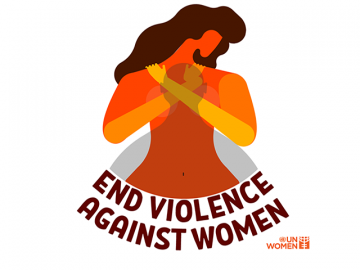Help us make the FRA website better for you!
Take part in a one-to-one session and help us improve the FRA website. It will take about 30 minutes of your time.
EU rights and equality agency heads: EU countries must work together to eradicate violence against women

"Women and girls across Europe continue to face violence. The pandemic has made this flagrant human rights abuse even worse, as lockdowns and economic uncertainty leave many women living in continuous fear," said FRA Director Michael O'Flaherty. "Authorities at all levels need to work better together to effectively protect women and put an end to violence and abuse."
“Violence against women happens in every EU country. We need to work together to create societies where violence is eradicated. We need to put laws in place that really work to stop violence against women. And we need to collect better data to monitor the situation all the time,” said EIGE Director Carlien Scheele.
Since the Covid-19 pandemic started, women’s shelters and non-governmental organisations have been reporting a surge in violence against women. Shelter and counselling staff have been overwhelmed due to increased demand during lockdowns, as EIGE shows in its 2021 report.
FRA also highlighted the reality of increases in domestic violence in some of its Bulletins on the impact of the coronavirus pandemic on fundamental rights.
The worsening Coronavirus situation is likely to see similar patterns emerge once again.
Already before the pandemic, gender-based harassment and violence in Europe was widespread, as FRA’s ‘Crime, safety and victims’ rights’ report highlights. Family members or relatives (32%) are most often responsible for physical attacks against women, as many of these incidents take place at home (37%).
This makes women and girls particularly vulnerable, as lockdowns and economic uncertainty can leave them trapped at home with abusive partners or relatives.
Many countries learned from the first wave of lockdowns. They now provide more targeted support to protect women. But with femicide reports increasing across Europe, it is clear that governments need to step up their efforts to stop violence against women and girls. To support these efforts, EIGE has just published a package to help EU countries name, count and end femicide.
To start with, all EU countries should ratify the Istanbul Convention on preventing and combating violence against women and domestic violence. It is a tool that supports countries in eliminating this widespread human rights abuse. Yet to date, only 21 EU countries have ratified it. Others should follow suit without delay.
Governments should provide the police, justice and health sectors with adequate resources and relevant training, so they can work better together to prevent violence and support victims.
The European Commission has committed to proposing by the end of this year an EU-wide law to combat violence against women. This will be an important step to prevent and prosecute violence against women, both online and offline.
To mark the International Day for the Elimination of Violence Against Women, EIGE and FRA are joining the annual ‘Orange the World’ awareness raising campaign to end violence against women and girls.
Join us on social media using the hashtag #OrangeTheWorld.
Let’s all work together to end violence against women and girls.
More information
To support the efforts to eliminate violence against women, FRA and EIGE will continue to provide their data and expertise:
- In 2022, EIGE will release a study examining to what extent EU countries are delivering justice for femicide victims and their families. EIGE will also release a study examining cyber violence across the EU, with recommendations for commonly agreed definitions.
- A joint FRA-EIGE survey will collect data on violence against women in those EU Member States that are not taking part in the Eurostat-led data collection on violence against women. By combining data from the FRA-EIGE survey with the Eurostat-led project on gender-based violence, FRA and EIGE will be able to examine the situation across the EU and compare it with FRA data from 2012. A joint FRA-EIGE report is planned for 2024.